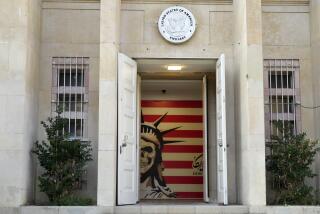Iran’s Ayatollah Khamenei says opposition protests failed
- Share via
CAIRO AND TEHRAN — Supreme leader Ayatollah Ali Khamenei attempted to unify Iranians on Sunday by blaming foreign media for “poisoning the atmosphere” and urged his nation to resist the “killer cancer” of an Israel backed by Western powers.
Delivering a sermon at Tehran University before a crowd that included President Mahmoud Ahmadinejad and opposition cleric Ayatollah Ali Akbar Hashemi Rafsanjani, Khamenei said the West had failed in its attempts to undermine the government with large opposition protests during countrywide anti-Israel rallies Friday.
“It showed that their [Western politicians’] tricks, spending money and political evilness do not influence the Iranian nation,” said Khamenei, who was greeted with chants of “Leader, we offer our blood to you.”
The 70-year-old spiritual leader’s attacks on Israel echoed the vitriol of Ahmadinejad’s speech two days earlier in which the president called the Holocaust a lie. Khamenei sought to reestablish his authority and calm an electorate divided by demonstrations, mass arrests and allegations of police torture after the president’s disputed reelection in June over opposition leader Mir-Hossein Mousavi.
Iranian officials over the weekend also had to contend with a dramatic shift in U.S. missile defense plans to counter potential Iranian strikes. President Obama’s new policy calls for scrapping a missile defense system in Poland and the Czech Republic championed by former President George W. Bush and moving a defense shield closer to Iran to protect Israel and Europe from what U.S. officials describe as Iran’s rapidly developing program of short- and medium-range missiles.
The decision was praised by Russia, which had argued that a defense system in Eastern Europe was a threat to its borders. The White House won points with Moscow, and Iranian analysts wondered how the prospect of warmer U.S.-Russia ties would affect Moscow’s relationship with Tehran. Russia has traditionally opposed U.S. attempts on the U.N. Security Council to increase economic sanctions on Iran over its nuclear program.
“The Iranian foreign diplomacy machine has been shocked by the missile decision. They did not predict it,” said Mashallah Shamsolvaezin, an expert on Middle East affairs. “But Russia will keep using Iran as a stick against the West wherever and whenever it suits her and serves her purposes. However, it is a message to Iranian authorities that friendship and enmity between countries do not last forever and that each country, at the end of the day, decides based on its interests.”
Mohammad Marandi, head of the North American studies department at the University of Tehran, does not believe the missile decision will harm Iranian-Russian relations.
“The U.S. administration may expect some rewards from Russia because of the change in missile shield, but it was obvious from the beginning that the shield had nothing to do with Iran’s threats,” he said. “The shield was installed against Russia and it was related to U.S.-Russia relationship.”
In a speech after his sermon, Khamenei said the West knows that “it’s not true” that Tehran is seeking nuclear weapons, and that the allegations are “part of an Iranophobia that controls the behavior of these arrogant governments.”
Khamenei focused on national unity in his sermon celebrating the Eid al-Fitr festival that marks the end of the Muslim fasting month of Ramadan. He blamed factional political fighting for creating “rumors and mutual slanders that have darkened and made gloomy the hearts of the people.”
More to Read
Sign up for Essential California
The most important California stories and recommendations in your inbox every morning.
You may occasionally receive promotional content from the Los Angeles Times.







